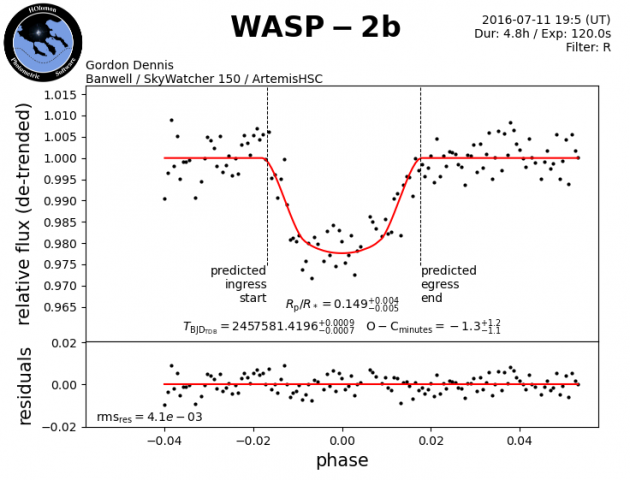› Forums › Exoplanets › Obtaining a good Fit in HOPS – possible photometry problem
- This topic has 4 replies, 2 voices, and was last updated 4 years, 11 months ago by
Roger Dymock.
-
AuthorPosts
-
4 March 2021 at 5:49 pm #574908
 Gordon DennisParticipant
Gordon DennisParticipantThis is an Exoclock newbie query. As recommended, I am using the data on the Exoworld Spies site (https://www.exoworldsspies.com/en/observers/) to “practice” using HOPS prior to using it for my own observations.
I have been using the data for Qatar-1b because this is the example given in the user manual.
I seem to be unable to get anything like a close Fit.This is the best result I have.

I think the problem lies in the photometry phase. I have tried using different comparison stars and in particular different apertures but I don’t seem to be making any headway.Can anyone advise please?
Gordon DennisAttachments:
17 March 2021 at 9:33 am #583953Roger Dymock
ParticipantHi Gordon,
I had a similar problems when I tried to use the examples and found some did not give good results. Could I suggest;
a) You try another example
b) Obvious i know but do make sure you have got the correct target start by checking at https://www.exoclock.space/database/planets. Clicking on the target in the list will give you the field of view. HAT-P-32b might be a good example as it has quite a large transit depth
Regards
18 March 2021 at 3:33 pm #583957 Gordon DennisParticipant
Gordon DennisParticipantHi Roger
I did try another example, and had much better results:

Using this lightcurve i estimated the exoplanet radius in the usual way:


The result I obtained was

Not too bad since the accepted value is 1.079 ± 0.033. The difference could be just trying to estimate D from the laptop screen.
I’ve been checking coordinates using SIMBAD.
Whether this is because the data is better or because I’m getting better at using HOPS I’m not sure.
Best regards
Gordon
18 March 2021 at 3:36 pm #583959 Gordon DennisParticipant
Gordon DennisParticipantI ought to have paid a little more attention to the plot. HOPS gives you Rp/R* – in this case 0.149 +0.004/-0.005.
According to SINBAD the stellar radius of WASP-2A is 0.821 +/- 0.013 RSun.
Using these data I get a mean value for WASP-2b of Rp=1.22Rj, with an upper limit Rp=1.27Rj and a lower limit Rp=1.16Rj.
Seems I was a little closer to the accepted value by eye-balling the lightcurve.
Best regards
Gordon21 March 2021 at 3:28 pm #583986Roger Dymock
ParticipantHi Gordon, Glad to be of help. You don’t need to do your own estimate as HOPS does it for you – 0.149 as on your light curve. Measuring the total depth of the light curve will give you an incorrect (too large which is what you have) a result as something called limb darkening has to be taken into account. See https://britastro.org/sites/default/files/Infinite%20Worlds%20Issue%209.pdf for an explanation of this.
Regards
-
AuthorPosts
- You must be logged in to reply to this topic.
